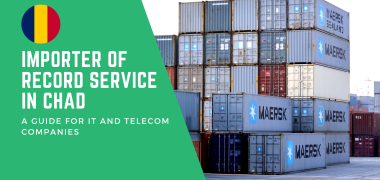Chad, a landlocked country in Central Africa, is increasingly becoming a focal point for IT and telecom companies looking to expand their operations in Africa. The country’s growing demand for improved telecommunications infrastructure and IT services presents significant opportunities for businesses in these sectors. However, entering the Chadian market requires navigating a complex web of import regulations, duties, and taxes. This guide aims to provide IT and telecom companies with a comprehensive understanding of the Importer of Record (IOR) service in Chad, detailing the import duties and taxes on IT and telecom equipment, and the special permits and approvals needed to facilitate a smooth import process.
What is an Importer of Record (IOR)?
An Importer of Record (IOR) is a legal entity or individual responsible for ensuring that imported goods comply with local laws and regulations. The IOR handles all import-related responsibilities, including the payment of duties and taxes, obtaining necessary permits and approvals, and ensuring compliance with customs regulations. For IT and telecom companies, utilizing an IOR service can simplify the process of importing equipment and help avoid potential legal and logistical issues.
Why IT and Telecom Companies Need IOR Services in Chad
Navigating Complex Regulations
Chad’s import regulations are complex and can be challenging to navigate, especially for companies unfamiliar with the local customs and practices. An IOR service can help IT and telecom companies understand and comply with these regulations, reducing the risk of delays and penalties.
Streamlining the Import Process
IOR services streamline the import process by handling all the necessary documentation and administrative tasks. This allows IT and telecom companies to focus on their core business activities without getting bogged down in the intricacies of customs procedures.
Ensuring Compliance
Compliance with local laws and regulations is crucial for the successful importation of goods into Chad. IOR services ensure that all imported equipment meets the required standards and regulations, preventing legal issues and ensuring smooth operations.
Import Duties and Taxes on IT and Telecom Equipment in Chad
Import Duties
Import duties in Chad vary depending on the type of equipment being imported. Generally, IT and telecom equipment are subject to customs duties ranging from 5% to 20% of the equipment’s value. The specific rate depends on the classification of the equipment under the Harmonized System (HS) codes used by Chadian customs.
Examples of Duties on Common IT and Telecom Equipment:
- Computers and Laptops: Typically subject to a 10% import duty.
- Networking Equipment: Such as routers and switches, may attract a 15% duty.
- Telecommunication Devices: Including mobile phones, often face a 20% import duty.
Value-Added Tax (VAT)
In addition to import duties, IT and telecom equipment are also subject to Value-Added Tax (VAT). The standard VAT rate in Chad is 18%. This tax is applied to the total value of the equipment, including the cost, insurance, and freight (CIF) value plus any applicable import duties.
Other Taxes and Fees
Other taxes and fees may apply to the importation of IT and telecom equipment, including:
- Statistical Tax: A tax levied on all imports, typically around 1% of the CIF value.
- Customs Processing Fee: A fee charged for the processing of customs documentation, usually around 0.5% of the CIF value.
Special Permits and Approvals Needed
Telecommunications Regulatory Authority (ARCEP)
The Telecommunications Regulatory Authority in Chad, known as ARCEP (Autorité de Régulation des Communications Electroniques et des Postes), is responsible for regulating the telecom sector. IT and telecom companies must obtain permits and approvals from ARCEP to import and operate telecom equipment in Chad.
Type Approval
Type approval is a mandatory certification process for telecom equipment in Chad. It ensures that the equipment meets the technical and safety standards set by ARCEP. Companies must submit samples of their equipment for testing and certification before they can be imported and used in Chad.
Import Licenses
Certain IT and telecom equipment may require import licenses from the Ministry of Trade and Industry. This license is necessary for the legal importation of goods into Chad and ensures that the equipment complies with national standards and regulations.
Environmental Compliance
IT and telecom equipment must comply with environmental regulations in Chad. This includes adhering to standards for electronic waste management and ensuring that imported equipment does not contain hazardous materials.
Security Clearance
For certain types of telecom equipment, especially those used for communication networks, companies may need to obtain security clearance from the Chadian government. This ensures that the equipment does not pose a threat to national security.
Steps to Import IT and Telecom Equipment into Chad
Step 1: Engage an IOR Service Provider
Engaging a reputable IOR service provider is the first step to ensuring a smooth import process. The IOR will handle all the necessary documentation, compliance checks, and communication with Chadian customs authorities.
Step 2: Obtain Necessary Permits and Approvals
Work with your IOR service provider to obtain all necessary permits and approvals from ARCEP, the Ministry of Trade and Industry, and other relevant authorities. This includes obtaining type approval, import licenses, and security clearances as needed.
Step 3: Prepare and Submit Documentation
Ensure that all required documentation is prepared and submitted to Chadian customs authorities. This includes commercial invoices, packing lists, certificates of origin, and any permits or approvals obtained in the previous step.
Step 4: Pay Duties and Taxes
Calculate and pay the applicable import duties, VAT, and any other taxes or fees. Your IOR service provider can assist with this process to ensure accuracy and compliance.
Step 5: Customs Clearance
Once all duties and taxes are paid, and the documentation is approved, the equipment will undergo customs clearance. This process may include inspections and verification by customs officials to ensure compliance with Chadian regulations.
Step 6: Delivery and Installation
After customs clearance, arrange for the delivery and installation of the equipment. Your IOR service provider can coordinate with local logistics companies to ensure timely and efficient delivery.
Conclusion
Importing IT and telecom equipment into Chad presents unique challenges, but with the right knowledge and support, these challenges can be effectively managed. Utilizing an Importer of Record service is a strategic move for IT and telecom companies looking to expand their operations in Chad. An IOR service not only simplifies the import process but also ensures compliance with local regulations, reducing the risk of delays and legal issues.
By understanding the import duties, taxes, and necessary permits and approvals, IT and telecom companies can navigate the complexities of the Chadian market and seize the opportunities it offers. With a growing demand for improved telecommunications infrastructure and IT services, Chad represents a promising market for companies in these sectors.
Engaging a reputable IOR service provider, obtaining the necessary permits and approvals, and ensuring compliance with local regulations are critical steps to success. By following the guidelines outlined in this article, IT and telecom companies can ensure a smooth and efficient import process, paving the way for successful operations in Chad.




